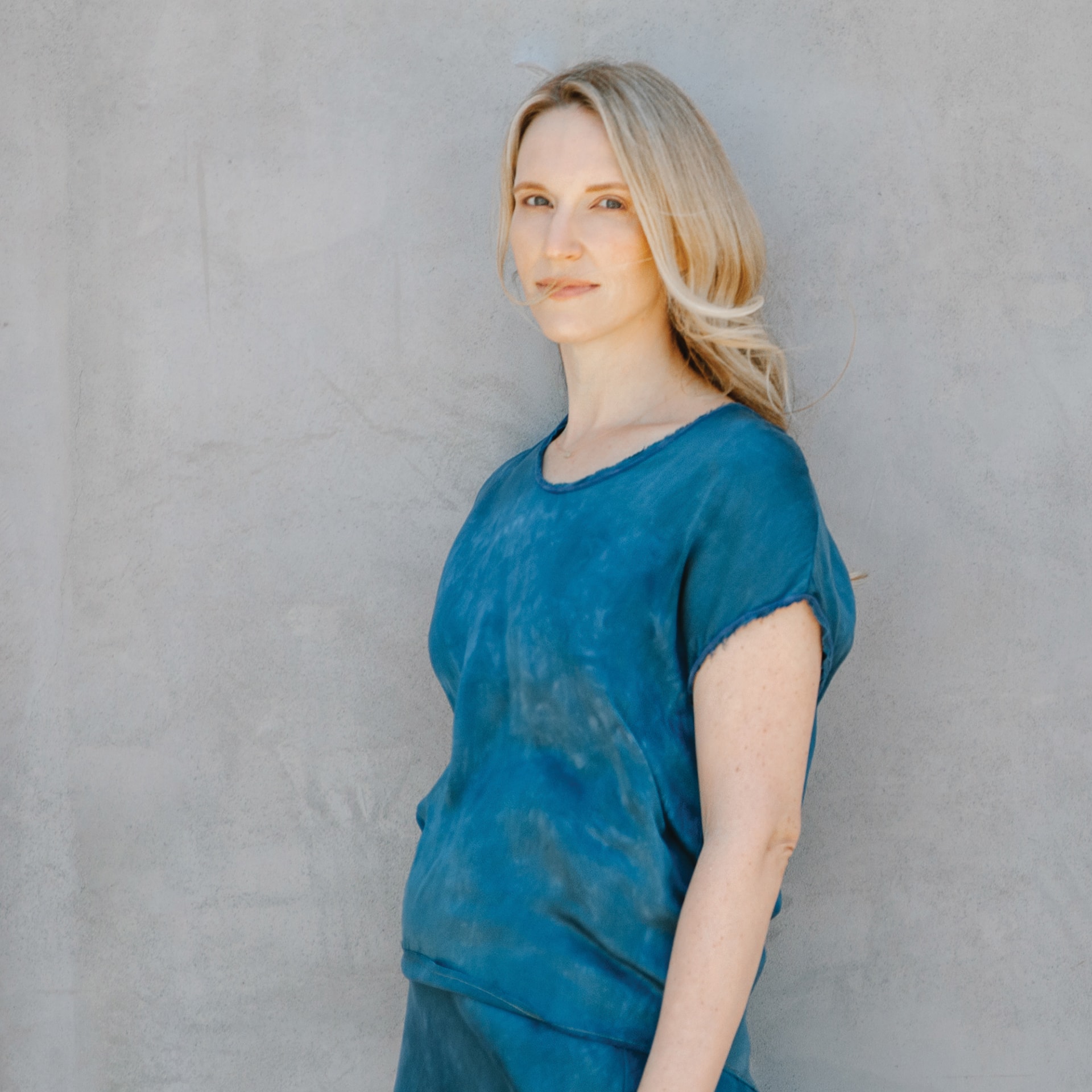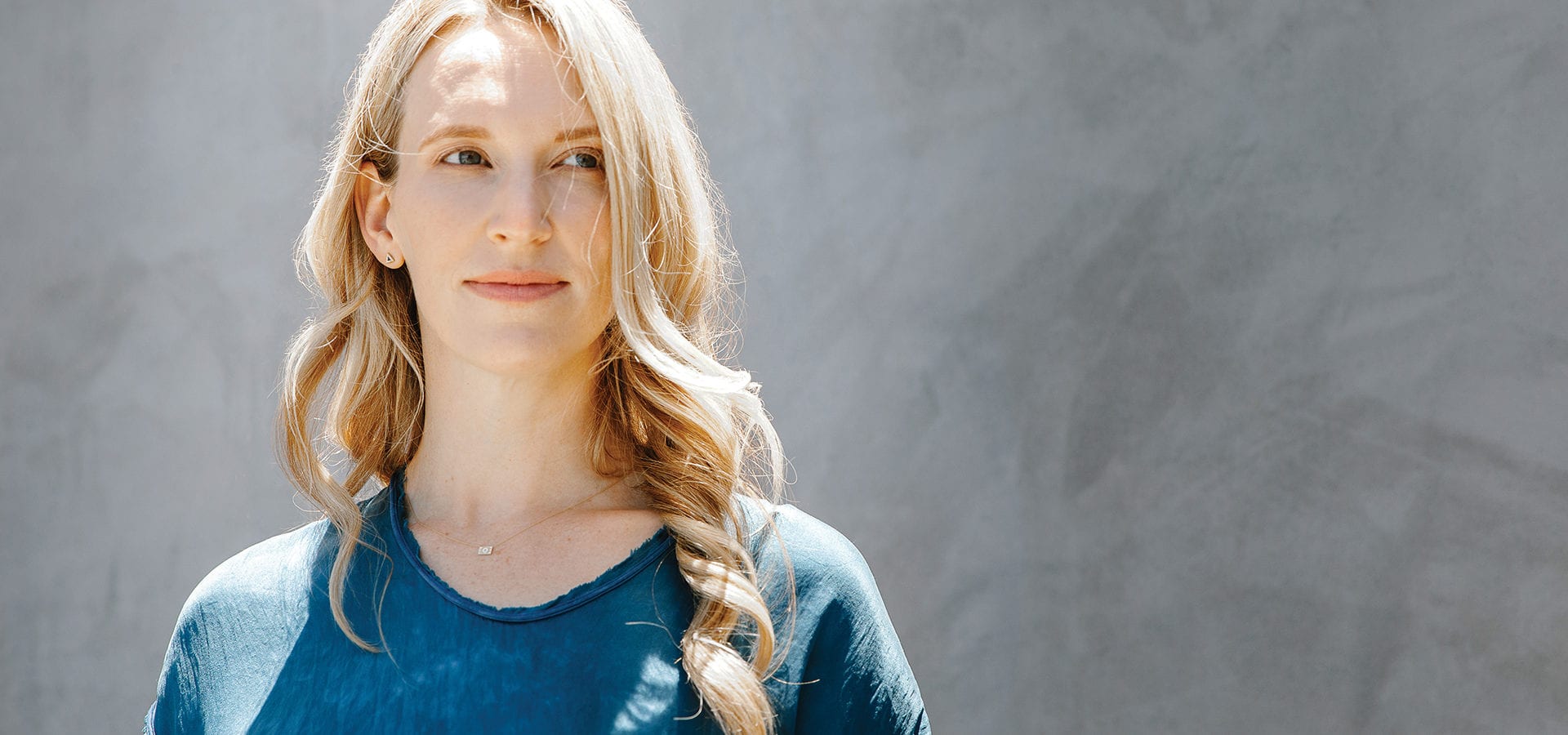After a Decade at Google, San Francisco Author and Audioshake CEO Jessica Powell Is Shaking Things Up
The big disruptor
-
CategoryGiving Back, Makers + Entrepreneurs, Tech
-
Written byJane Ganahl
-
Photographed byHillary Jeanne
Tech executive, journalist, and author Jessica Powell left the hallowed halls of Google in 2018 after spending 10 years guiding the search giant’s 200-person communication and PR efforts all over the world. And despite having subsequently written a hilariously barbed satire on the Silicon Valley workplace (The Big Disruption: A Totally Fictional But Essentially True Silicon Valley Story), she still thinks fondly of her old stomping grounds.
“I think what people get wrong about the Valley is that everyone is motivated by greed,” she says. “When in fact the majority of people have good intent and want to create things that can impact millions in a positive way.”
So why did she leave her powerful post? Call it a hunger for a new challenge. Powell is one of those restless souls who needs to keep moving, testing, and learning. In addition to her time at Google, she worked in journalism, marketing, translation, and policy in Europe and Asia. She has lived in 10 countries, speaks six languages, and has three kids (ages 6, 4, and 2). She has conquered many worlds, but still itches to explore the next one.
“It’s a rare person who feels the itch for a challenge beyond the already challenging role of leading comms at Google,” said Google CEO Sundar Pichai, to whom Powell was a close advisor, in a statement to Recode. “But Jessica is that rare person.”
And unlike many execs, she did not leave for a larger and more lucrative opportunity, but for the halls of academia (an MFA in creative writing at San Francisco State University) and a fledgling startup.
“I go to school but it’s very part time—if I graduate at all it will be in, like, 2030,” she laughs. “It’s one night a week. I’m also working on my second novel, which I largely do at night—or in the morning if I’m really disciplined.”
Still, she’s good on deadline, as she’s discovered by working as a freelance journalist for several publications including Wired, Time, Fast Company, Medium (the outlet that published her book), and now The New York Times. “They just made me a contributing writer,” she says of the Times, “which means I need to do a piece for the opinion section every month—not necessarily humor.” Though humor is indeed Powell’s specialty, as evidenced by recent posts about failing at pandemic hobbies, and the mass revolt of household appliances.

And let’s not forget her “day job” as CEO of the new music tech firm, Audioshake. Attempting to explain their mission to this Luddite, she summarizes. “We use AI to break songs into their component stems—we can take a song and break it into samples, karaoke, drums, isolated instruments. We work with people who own the rights and it makes more money for musicians.”
All this, and she somehow manages to co-parent her three children with relative aplomb. “Once you get to where the kids outnumber you, you become more relaxed,” she quips. “And there just isn’t enough room for them to be whiny.”
She co-founded Audioshake with her husband Luke, whom she met in the freshman dorm on her first day at Stanford, where she studied comparative literature. For a dozen years they bounced around the globe pursuing educational and professional opportunities, including a stint in Paris where she wrote her first book, Literary Paris: A Guide, which features intriguing slices of history about love and literature in the City of Lights. They eventually landed in London, where Powell got for her first tech job—as a consultant at Google.
In the years since, Powell rose to the top of her profession until she was in charge of all of Google’s global internal and external communications. She and Miner returned to San Francisco, which she now calls home. “For all of SF’s failings it’s still a pretty great place,” she says. “It still has diversity and great access to nature—you can be in the water or the mountains in just a short drive.”
There were also a few stops at other firms—including one where sexism and a mono-culture of thought were rampant. These experiences provided the backdrop for her second book, The Big Disruption, which made a splash when it was released in 2018. It was the first novel put out on the Medium.com platform, where it was so widely read that it was later released in paperback and e-book form. Said The New York Times in its review, “Not long ago, it was Jessica Powell’s job to defend Silicon Valley. And while the events in her satire are purposefully and hilariously over the top, her diagnosis of Silicon Valley’s cultural stagnancy is so spot on that it’s barely contestable.”
This, it seems, is Powell’s biggest concern for her milieu. “When you have an industry that is very homogenous and surround yourself with people like yourself it’s really hard to see the broader implications of what you do, and the broader impacts,” she says. “For example, the first ‘smart watches’ were way too big for women’s wrists! Then you have things that speak to a lack of safety—like on social media platforms, where women and people of color are harassed at a much greater rate.”

Another example she cites is how Lyft was first designed. “It shocked me that you were supposed to get in the front seat with a stranger and ride around like you’re friends… and they are in charge of the door locks.” She shakes her head. “It points to the need for more diversity in designing things. These companies are generating a ton of money, so wouldn’t it be nice to include people from all walks?”
Powell does believe shifts are taking place, though it is a slow process. “On some level women in the Valley are there to help men realize their dreams. That is changing, but when you’re a huge company, progress is likely to be incremental. I’ve seen very few companies make big commitments to making change at the top level.”
She also notes the importance of opportunity for women and people of color who are struggling to create new companies. “Less than 5% of venture capital goes to women and much less to women of color,” she says ruefully. “When you consider how much women control spending, does this make sense? What you need to do is make sure you put money in the hands of women who can build for diversity.”
Powell notes that it’s also important, if you’re raising funds, to know where they are coming from. “My own company went with Precursor Ventures of SF—it’s very committed to diversity.”
Burnout with Silicon Valley’s failings and pace (“all I did was leap from crisis to crisis”) were chief among the reasons Powell has downsized her life to focus more time on her small startup, her family, and her writing. Her as-yet-unnamed third book will also have Silicon Valley as a backdrop, though it will be a much darker comedy.
“Yes, it’s about another workplace, so clearly I need to branch out!” she laughs. “About the sublimation of the individual to the group. Definitely a dark comedy, with people in HR trying to kill each other.”
When it sees publication, she will have a new host of fans ready to embrace it. But first, she has to find time to write it.
“I do admire people who can just sit down and write wonderful things on the spur of the moment!” she sighs. “But that’s not me—I have to put it on my to-do list, which is already lengthy.”
But Jessica Powell will certainly rise to the challenge.
Two Former Marines Captain a Game Changer in Underwater Athletics
Underwater torpedo, anyone?
Remembering Walt Disney Studios’ Dumbo and Fantasia Animator Milton Quon
The longtime Torrance resident died at age 105 in June.
Out of Office: Flight Time with Terranea Resort Falconer Joe Roy III
Taming wild birds in southern California.
Get the Latest Stories






